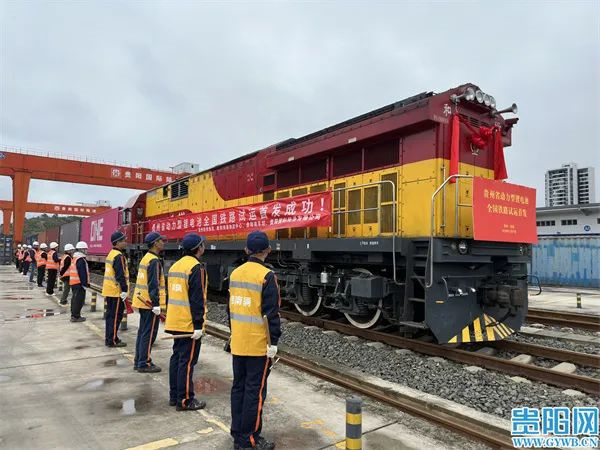

The freight train carrying lithium batteries departs from Guiyang International Land Port, heading east to Shanghai. [Photo/Guiyang news network]
On Nov 19, a freight train carrying lithium batteries made by CATL, a Chinese battery-manufacturing giant, departed from Guiyang International Land Port in Guiyang, capital of Southwest China's Guizhou province, heading east to Shanghai. This marks the first nationwide pilot project for the railway transport of lithium batteries jointly launched by Guizhou, Sichuan, and Chongqing, and signifies a breakthrough in railway transport for Guiyang International Land Port.
Demand for lithium batteries — the "heart" of electric vehicles — has surged in recent years. Batteries are crucial for supporting the high-quality development of the new energy vehicle (NEV) industry. However, in China, battery transportation currently relies heavily on road and waterway transport. In 2023, approximately 9.4 million metric tons of batteries were transported via road, accounting for over 90 percent of the total.
Compared with road and waterway transport, railway transport offers advantages such as high capacity, shorter cycles, enhanced safety, moderate costs, and environmental friendliness. Although domestic rail transport was previously limited to consumer lithium batteries, this trial run will change the status quo, allowing the transport of lithium batteries for new energy vehicles.
In September this year, China Railway Chengdu Group Co formulated the initial trial plan for the route from Guiyang International Land Port to the dedicated line of Sinopec Shanghai Petrochemical Co. The China Academy of Railway Sciences Co led the development of specialized 40-foot containers for lithium batteries, equipped with features such as flame resistance, thermal insulation, and pressure relief ventilation. The company also established container transport conditions and loading plans to ensure safe transportation.
Guizhou, with its abundant phosphate resources, is emerging as a key production base for lithium iron phosphate cathode materials. The success of this trial transport of lithium batteries will significantly help Guizhou transform its resource advantages into industrial and economic strengths, fostering the growth of new productive capacities.
The lithium batteries produced at CATL's Guizhou base are expected to "ride" the China-Europe freight trains via Guiyang International Land Port for export to Europe and beyond.